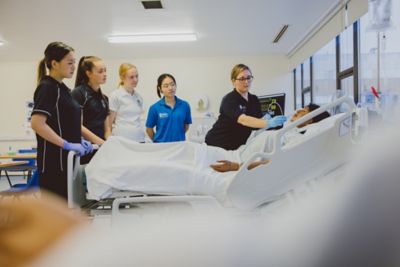Placements
On this course, subject to meeting the relevant criteria, you will undertake a range of placement learning blocks, that vary in length. Throughout placement students are supported by experienced practical assessors and supervisors within clinical settings.
Placements can be located within four large NHS trusts and local private or independent healthcare providers, in Nottinghamshire, Derbyshire and Leicestershire. They take place in a range of settings including medical, surgical, acute care and community nursing.
In order to undertake a placement, you will need to achieve the relevant academic requirements and clearance requirements as set by the University and meet any requirements specified by the placement host.
Elective placement
There is an 'elective placement' opportunity during the programme which you will arrange yourself, with some support from the school. This is an opportunity to get a deeper understanding of nursing, in an area that you're most interested in personally.
To find out more about placements and the elective placement for Adult Nursing BSc see our placements webpage.
Please be aware that elective opportunities, study abroad, compulsory year abroad, optional placements, internships and integrated year in industry opportunities may change at any time for a number of reasons, including curriculum developments, changes to arrangements with partner universities or placement/industry hosts, travel restrictions or other circumstances outside of the university’s control. Every effort will be made to update this information as quickly as possible should a change occur.
Placements
On this course, subject to meeting the relevant criteria, you will undertake a range of placement learning blocks, that vary in length. Throughout placement students are supported by experienced practical assessors and supervisors within clinical settings.
Placements can be located within four large NHS trusts and local private or independent healthcare providers, in Nottinghamshire, Derbyshire and Leicestershire. They take place in a range of settings including medical, surgical, acute care and community nursing.
In order to undertake a placement, you will need to achieve the relevant academic requirements and clearance requirements as set by the University and meet any requirements specified by the placement host.
Elective placement
There is an 'elective placement' opportunity during the programme which you will arrange yourself, with some support from the school. This is an opportunity to get a deeper understanding of nursing, in an area that you're most interested in personally.
To find out more about placements and the elective placement for Adult Nursing BSc see our placements webpage.
Please be aware that elective opportunities, study abroad, compulsory year abroad, optional placements, internships and integrated year in industry opportunities may change at any time for a number of reasons, including curriculum developments, changes to arrangements with partner universities or placement/industry hosts, travel restrictions or other circumstances outside of the university’s control. Every effort will be made to update this information as quickly as possible should a change occur.





